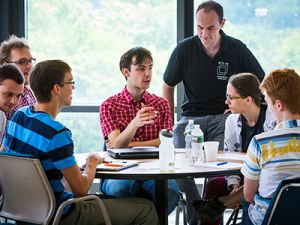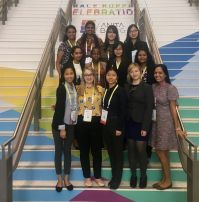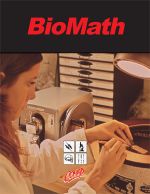From its earliest days, integrating research and education has been central to the mission of DIMACS. DIMACS has led and continues to lead a variety of innovative education programs that bring research into classrooms at all levels. Below are the education programs that are currently active.
A more comprehensive list of past DIMACS education programs is archived here.
Research Experiences for Undergraduates (REU): DIMACS’s long-running REU program immerses undergraduate students in a unique multidisciplinary environment that exposes students to a broad  range of computational and mathematical topics, applied in contexts that range from bioinformatics to big data. Unique features of the DIMACS program include involvement of industry partners, mentors from a range of academic departments, and an international component coordinated with Charles University in Prague. By combining with other REU programs, a typical summer brings 30 or more undergraduates to DIMACS to work one-on-one with a mentor while benefiting from a rich variety of group activities.
range of computational and mathematical topics, applied in contexts that range from bioinformatics to big data. Unique features of the DIMACS program include involvement of industry partners, mentors from a range of academic departments, and an international component coordinated with Charles University in Prague. By combining with other REU programs, a typical summer brings 30 or more undergraduates to DIMACS to work one-on-one with a mentor while benefiting from a rich variety of group activities.
Douglass-SAS-DIMACS Living-Learning Community for Women in CS (CS LLC): Launched in 2016, the CS LLC is an immersive educational experience striving to enhance the recruitment and retention of women in CS. Students in the CS LLC live together as a community associated with Douglass Residential College for their entire freshman year. During this time, most will complete the first two core courses of the CS major and receive benefits such as mentoring,  peer support, a seminar course on modern applications of CS, as well as a wide range of organized social, academic, and outreach activities.
peer support, a seminar course on modern applications of CS, as well as a wide range of organized social, academic, and outreach activities.
Douglass-DIMACS Computing Corps (DDCC): DDCC seeks to broaden participation in computing through a multi-layered mentorship and leadership model. Undergraduate students in DDCC work with CS faculty and graduate students to design fun and interactive group activities for middle school girls to excite them about computing. They then bring these activities—building websites or using Scratch, Java or Finch Robot—to middle schools throughout the year, and they host fieldtrips for middle school students at Rutgers. DDCC provides undergraduates with community and mentoring, as these students become leaders, mentors, and ambassadors for computing with middle school girls.
Summer Reconnect Workshops: Reconnect workshops expose faculty teaching undergraduates to current research topics that are relevant for classroom presentation. Each summer features a topic that is presented in a week-long series of lectures and related activities led by an expert in the field. Participants engage in research activities and in writing materials that will be useful in the classroom.
MPE Materials for Undergraduate Classrooms: In an effort related to the world-wide Mathematics of Planet Earth program, DIMACS helped develop short modules for undergraduate classrooms that highlight topics associated with MPE. The one-day modules illustrate a core mathematics concept set in a context of specific planet Earth application. The modules are intended to challenge students to engage in a discussion about the MPE topic, while also observing the applicability of mathematics.
Workshops for K-12 Teachers: DIMACS partners with the Rutgers mathematics department and the Association of Mathematics Teachers of New Jersey to sponsor a variety of highly interactive, one-day professional development workshops for K-12 teachers of mathematics.
Projects Developing High School Classroom Materials:
For more than a decade, DIMACS has led efforts to develop novel materials that bring mathematical and computational methods and thinking into high school classrooms. These materials take the form of “modules” that typically provide materials for 3-5 hours in the classroom. The modules are well-vetted, align with standards, and can be flexibly adapted for use in a variety of courses at a variety of grade levels. The interdisciplinary nature of the modules makes them amenable to individual or team teaching and offers students a contemporary view of science, and STEM more broadly, as a multidisciplinary enterprise. All of the modules are available for free through COMAP.
BioMath: DIMACS-led efforts in bio-mathematics led to development of a group of twenty modules linking mathematics and biology.  The modules can be used individually or combined to form new courses in mathematical biology. Since the materials first became available, a variety of new courses emerged. These include one- and two-semester courses, offered as science courses in some schools and math courses in others.
The modules can be used individually or combined to form new courses in mathematical biology. Since the materials first became available, a variety of new courses emerged. These include one- and two-semester courses, offered as science courses in some schools and math courses in others.
VCTAL: The Value of Computational Thinking Across Grade Levels (VCTAL) project developed twelve modules designed to cultivate computational thinking (CT) skills in high school students by applying it in nontraditional contexts. Sample topics include online privacy, cryptography, medical tomography, analysis of games, buying an electric car, and stable matching.
PS-Future: The Mathematical and Computational Methods for Planning a Sustainable Future (PS-Future) project is developing a set of ten modules on themes that illustrate the use of mathematical and computational methods for understanding and addressing sustainability issues facing our world. Each module addresses disciplinary core concepts required by science standards, especially those in environmental science and biology. Sample topics include urban sustainability, habitat fragmentation, invasive species, and issues related to water.
For Undergraduate Students:
- Research Experiences for Undergraduates (REU)
- Douglass-SAS-DIMACS Living-Learning Community for Women in CS (CS LLC)
- Douglass-DIMACS Computing Corps (DDCC)
For Undergraduate Faculty:
For High School Students:
For K-12 Teachers:


